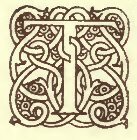 |
Project Gutenberg
Australia
a
treasure-trove of literature
treasure found hidden
with no evidence of ownership |
BROWSE the site for other works by this author
(and our other authors) or get HELP Reading, Downloading and Converting files)
or
SEARCH the entire site with
Google Site Search |
Title: The Antarctic Book: Winter Quarters, 1907-1909.
Author: E.H. Shackleton (Editor).
* A Project Gutenberg of Australia eBook *
eBook No.: 1304521h.html
Language: English
Date first posted: July 2013
Date most recently July 2013
Produced by: Ned Overton.
Project Gutenberg Australia eBooks are created from printed editions
which are in the public domain in Australia, unless a copyright notice
is included. We do NOT keep any eBooks in compliance with a particular
paper edition.
Copyright laws are changing all over the world. Be sure to check the
copyright laws for your country before downloading or redistributing this
file.
This eBook is made available at no cost and with almost no restrictions
whatsoever. You may copy it, give it away or re-use it under the terms
of the Project Gutenberg Australia Licence which may be viewed online.
GO TO Project Gutenberg
Australia HOME PAGE
Production Notes:
A few typographical errors have been corrected. The
illustrations are placed where the occur in the original.
THE ANTARCTIC BOOK
WINTER QUARTERS
1907-1909


Of this book only 300 copies have
been printed for sale. The type
is distributed, and it will not be
reprinted
THE ANTARCTIC BOOK
WINTER QUARTERS
1907—1909
LONDON
WILLIAM HEINEMANN
MCMIX
CONTENTS
THE SOUTHERN PARTY
I
E. H. SHACKLETON
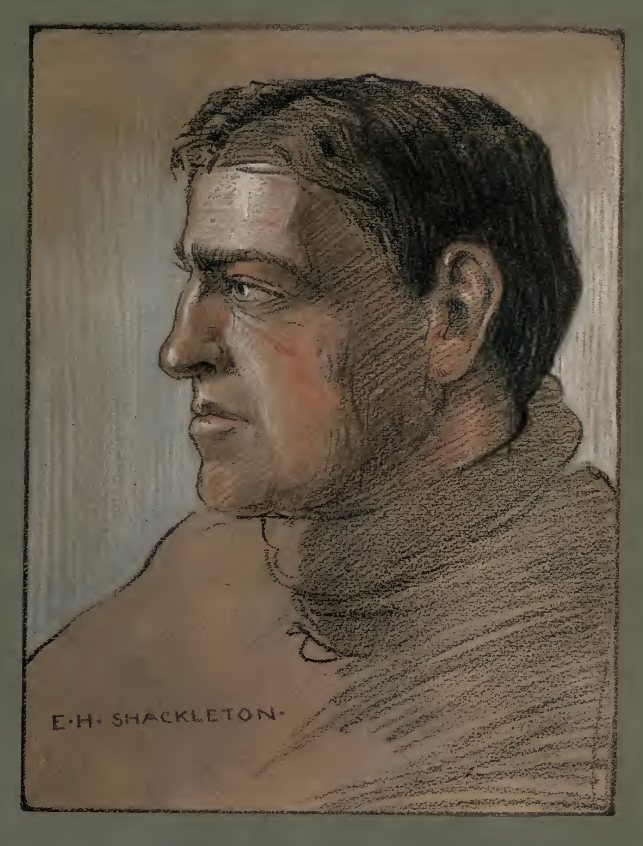
II
JAMESON BOYD ADAMS
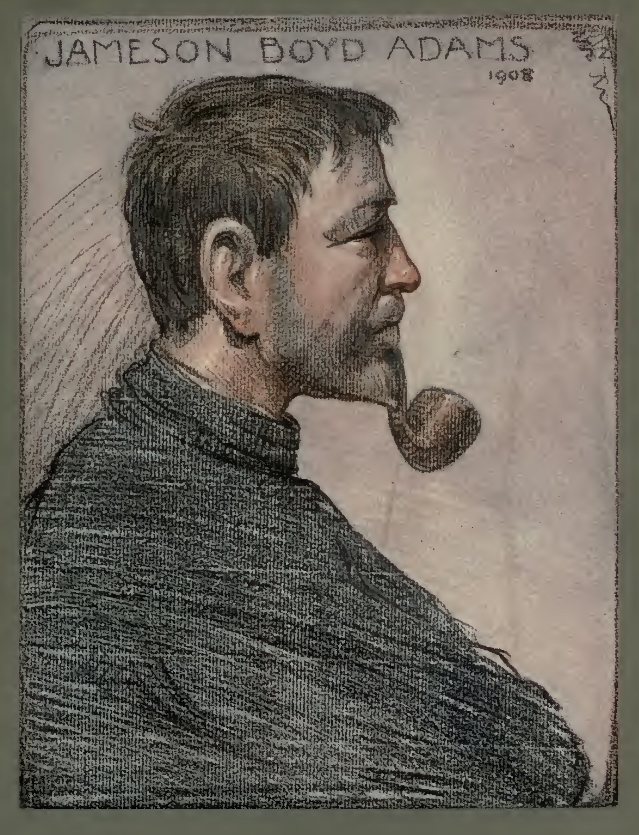
III
DR. ERIC MARSHALL
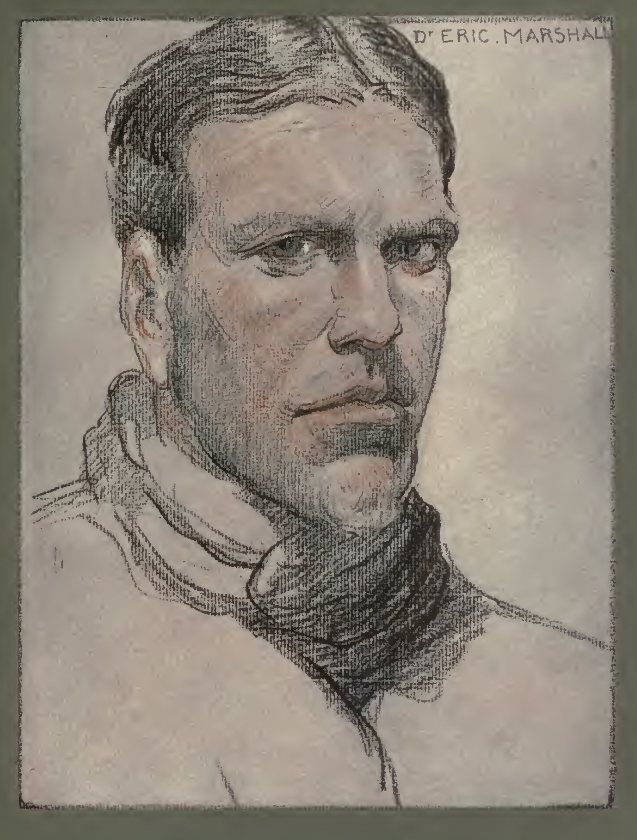
IV
FRANK WILD
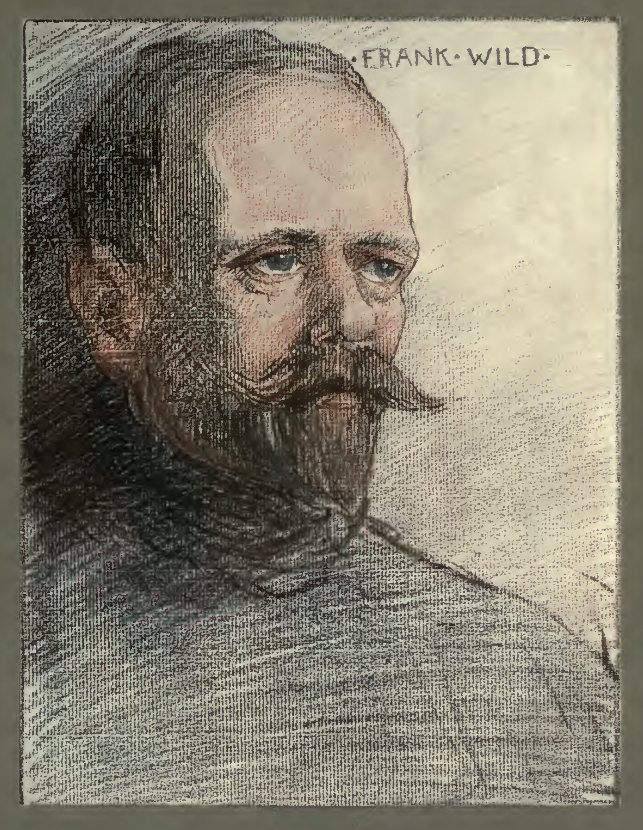
EREBUS
BY E.H. SHACKLETON

{Page 21}
EREBUS
EEPER of the Southern Gateway,
grim, rugged, gloomy and grand;
Warden of these wastes
uncharted,
as the years sweep on, you
stand.
At
your head the swinging smoke-cloud; at
your feet the grinding
floes;
Racked and seared by the inner fires, gripped
close by the outer snows.
Proud, unconquered and unyielding, whilst the
untold æons passed,
Inviolate through the ages, your ramparts
spurning the blast,
Till men impelled by a strong desire, broke
through your icy bars;
Fierce was the fight to gain that height where
your stern peak dares the
stars.
You
called your vassals to aid you, and the
leaping blizzard rose,
Driving in furious eddies, blinding, stifling,
cruel snows.
The
grasp of the numbing frost clutched hard
at their hands and faces.
And
the weird gloom made darker still dim-
seen perilous places.

AURORA AUSTRALIS
BY E.H. SHACKLETON
{Page 25}
AURORA AUSTRALIS
HEY, weary, wayworn, and
sleep-
less, through the long withering
night.
Grimly clung to your iron sides
till with laggard Dawn came the
light:
Both heart and brain upheld them, till the
long-drawn strain was
o'er,
Victors then on your crown they stood and
gazed at the Western
Shore;
The distant glory of that land in broad splen-
dour lay unrolled.
With icefield, cape, and mountain height, flame
rose in a sea of gold.
Oh! Herald of returning Suns to the waiting
lands below;
Beacon to their home-seeking feet, far across
the Southern snow;
In
the Northland, in the years to be, pale
Winter's first white sign
Will turn again their thoughts to thee, and the
glamour that is thine.
BATHYBIA
BY D. MAWSON
{Page 29}
BATHYBIA

FAINT stirring seemed to be going on about,
which gradually made itself felt on my yet somnolent senses.
Rising-time was evidently drawing nigh. The uncertainty shortly
came to an end when, in harsh tones, the familiar call sounded:
"Lash up and stow, lash up and stow; 8.30, and time all hands
were up." This announcement, coming as it did from a pair of
lungs boasting of an early training in St. Paul's Cathedral, and
matured in the Navy, was calculated to wake effectually the
profoundest slumberer, but did not prevent me turning over for a
final doze. ¶It hardly seemed any time, however, before we were
exerting our best efforts dragging the sledges onwards towards
the Southern goal. The drudgery of the journey over the great
"sastrugi" ruffled plateau of Victoria Land had now become felt
by all. Everlastingly our eyes wandered over the horizon in
search of new objects, but as yet nothing greeted our gaze more
than had been the bane of our march these last two hundred and
fifty miles, since leaving Mount Lister behind.
¶Why we had ever come to choose our present
route to the South—S.S.W. over the Victoria Land
Plateau—seemed impossible of explanation. It was generally
believed, however, that the strength of the meteorological
element had prevailed in this decision, as it was decidedly a
chance to get abundance of high-level data. Some of the more
outspoken, irritated by the monotony of the journey, now
expressed themselves in no measured terms regarding the
alteration of the original plans. More especially had discontent
arisen because of the fact that this had entailed the
substitution of man-power to the extent of the combined strength
of the expedition in place of the ponies. ¶To-day the march
proved more interesting, as scarcely had we got properly under
way before the Commander drew our attention to a peculiar
appearance in the sky, somewhat to the west of our course. It was
like nothing he had had experience of in this latitude during his
previous exploration with Captain Scott along the Great Ice
Barrier, Resembling open water, it suggested possibilities we had
never till now entertained. As the day wore on, the more real did
this phenomenon appear, so that every one was fired with a new
enthusiasm. The new sledges no longer seemed to offer any
resistance, so that we pressed onwards at a brisk pace for two
days.

The S.W. middle current wind, so prevalent to
the north, had now cut out, and the warmer south-seeking
anti-trade came down to the plateau level, helping us onward.
Some miles ahead a fog-bank hanging low upon the land obscured
the horizon. ¶On the morning of the third day we felt a crisis
was close at hand, as the sky in front contrasted strongly with
the uniform ice-blink we were now leaving behind. The
temperatures perceptibly rose as we came up to the fog-bank. The
tiny particles of ice floating in the air and producing the fog
were now so much more abundant that it was impossible for us to
see more than about a hundred yards ahead. The increased
temperature was due, evidently, to liberation of latent heat set
free by separation of the fog particles. ¶Camp had been pitched
and the "hoosh" served, when the hungry Scotchman was interrupted
in his occupation of devouring any remaining tit-bits by a shout
from without. Inquiring heads appeared from the tents, and
amongst the turmoil that ensued could be heard cries of "The
Bottomless Pit!" "Gehenna!" A moment later our astonished gaze
was greedily devouring the situation. The mist had temporarily
rolled back, revealing a steep slope commencing shortly in front
of us. The gradient increased rapidly until lost to sight in the
mist, a couple of thousand feet below. We appeared to be standing
on the ruin of a huge volcano of unprecedented proportions. The
wall on which we stood extended far to the north and south. Even
as we watched the cloud-bank rolled yet further back, and a more
extended view unfolded to our rapt gaze. The steep gradient,
already noted, ended below in a yet steeper slope, almost
wall-like, whilst dimly, in the depths below, snowless undulating
plains were visible. What a mighty wall guarded the secrets of
the abyss! What grandeur beyond anything to be expected! Our very
souls were elevated and burned with a desire to penetrate the
depths before us: yet how impossible this seemed I How could
mortal man scale such a wall as barred our progress? ¶Whilst our
thoughts ran thus, a better view being obtained to the south, we
descried a steeply dipping slope leading from the plateau down to
the depths below. This was developed in the form of a semi-cone
against the face of the wall, and appeared to be of volcanic
origin. This volcanic slope was certainly quite scaleable, and we
unanimously decided to attempt a descent by it. Many hours
afterwards camp was pitched on the plateau hard by the cone, and
all were oblivious of the sounds of revelry occasioned by the
snorers. ¶The following day the fog again enveloped the
landscape, and the time was spent making the necessary
preparations for the continuance of our journey with packs in
place of sledges. The depth of the abyss before us was very
great, but difficult at the time for us to judge. Afterwards it
proved to be about 30,000 feet, or some 22,000 below sea-level.
When at last the mist rose and we were able to proceed, advance
proved rapid for the first 12,000 feet, as we could glissade for
long stretches at a time; at this level, the temperature having
steadily risen during the descent, the ice-cap began to dwindle
and a lobed front was met extending amongst great accumulations
of morainic material stacked in the form of terraces along the
mountain-side. Thaw-water, developed in pools investing the
erratic boulders distributed over the ice, trickled away to unite
and form crystal-clear streams, soon lost in crevasses, whither
they plunged to swell the muddy waters of sub-glacial channels.
Camp was pitched at this stage, and we indulged in the usual
"hoosh." The air felt quite warm and moist, so much so that
instead of immediately after crawling into our sleeping-bags,
some time was spent in surveying the new scene before us. At
intervals spouting streams leapt from the glacier faces, and,
ploughing deep furrows in the morainic terraces at our feet,
continued their downward courses as mountain torrents, till,
almost lost in the distance below, they appeared as silver
streaks threading their way by winding courses across the
undulating plains of Bathybia, as we had unanimously designated
this region. Loud booming sounds proceeded upwards periodically
from the depths below, occasioned by the precipitation of small
avalanches breaking away from the ice-cap above. Our biologist
was busy examining lichens which coloured the boulders bright
hues. There was abundant evidence of low forms of plant and
animal life, though curiously restricted in range. ¶Affairs had
assumed such an interesting pitch that we lost no time in getting
under way the following day. Novelties appeared on every hand,
until we were in a condition to accept unmoved any new
discoveries, however radical. When at last the steep slopes had
been negotiated and the undulating plains reached, a much fuller
insight into the conditions prevailing in Bathybia had been
gleaned. The summer temperature averaged about 70°F., and was
evenly toned by abundance of water vapour and carbon dioxide in
the atmosphere. The air was distinctly oppressive on account of
its density and moisture, but even this passed unheeded in the
general excitement. The plant life had rapidly increased in
abundance as lower altitudes were reached. These were chiefly
algæ and fungi, though representatives of the mosses, liverworts,
and ferns were not wanting. On the plains a dominant red colour
pervaded the vegetation, owing to prolific growth of red algæ.
The existence of red-coloured plants was of course to be
expected, existing as they did in sunlight from which a large
proportion of the blue end of the spectrum had been eliminated,
in its passage through so great a thickness of atmosphere.
Finally the vegetation had already become very rank, and the
odours distinctive of some species were not at all pleasant.
¶However much the plant life interested us, it did not claim our
attention so much as less pretentious examples of the animal
kingdom. Small crawling, spider-like beasts had been noted close
below the glacier zone; since then larger forms had made their
appearance, some of which looked distinctly formidable. The
biologist had an encounter with one of these large-bodied,
short-legged animals, and was generally regarded as lucky in
securing the specimen without harm to himself. It measured a foot
in length, and was armed with vicious-looking mandibles. Though
not identical with anything we had ever seen before, it much
resembled a magnificent tick, and was pronounced as belonging to
the mite family. The existence of these great ticks constituted a
distinct element of danger, and precautions were taken to guard
against possible injury from that quarter. With this object in
view we were careful always in future to keep our ice-axes within
reach. ¶Our first camp on the plains was never to be forgotten.
Most of the time intended for sleep was spent in ridding
ourselves of an almost microscopic species of mite, which
infested our camping-ground and invaded our persons. We learnt
that a camp in comfort could be expected here only after taking
the precaution previously to burn off the vegetation from the
site. In this way obnoxious creatures were removed. Already our
progress was much impeded by the luxuriance of the vegetation,
and as this state of affairs did not show signs of improving, we
decided to attempt navigation on a river which lay about three
leagues to the north, and appeared to be the main drainage line
of this portion of Bathybia. ¶Some time elapsed before this new
method of procedure could be put to the test. Raft-building was
not without its troubles, as we were unacquainted with the
materials available, and consequently their floating qualities
had to be determined. At length a structure was completed which
rode lightly on the water, and was regarded by the seafarers
amongst us as distinctly promising. In its construction we
employed the dead trunks of huge fungi of a variety capable of
resisting waterlog. Large sheets of fungus several inches in
thickness, found growing over the ground in moist localities,
furnished an excels lent decking; whilst a spyrogyra-like alga
was found to answer splendidly as a cord for binding the
structure. ¶Whilst these preparations were in progress several
incidents of special interest occurred. One of these came near
proving fatal to one who had gained much in favour by rendering
signal service as a mountaineer during our descent. Provisions
had become alarmingly scarce, and a section of the company
decided that members of the scientific staff were much more
likely to excel as connoisseurs in the matter of food-stuffs than
prove experts in shipbuilding. As the labour of examining the
natural products at hand did not present an arduous aspect, the
scientist above referred to came manfully forward and offered his
services in this domain. Instructions were issued to the effect
that explorations should not be conducted far from camp, and the
route proposed to be taken should be clearly defined before
setting out. The investigator had been absent on his quest for
over two hours, and the commander, becoming anxious, set out in
search of the wanderer. The search party had gone hardly a couple
of hundred yards into the jungle when they stumbled upon the
prone body of the missing man. A giant tick was investigating the
carcase, and apparently Just about to commence operations on its
prize. The obnoxious creature was forthwith despatched, and the
body of the martyr reverently taken back to camp. He still
breathed heavily, but no wounds could be found on the body. A
dread feeling seized us, for, though living things had no terror
for us, yet the intangible found us weak. For long the doctor
diligently attended, in the uncertainty of the stroke,
administering small doses of alcohol from our limited medical
store. At last, after twelve hours, success crowned his efforts
and the patient regained consciousness. Even now his senses
seemed to have lapsed,

and in his delirious ramblings, amongst
inarticulate expressions, could be heard, "Yon's the recht stuff,
mon, aye it is!" Later on he seemed to come to himself again, as
he weakly asked for tea. Indeed so frequent became his cravings
for this beverage that one of us was told off specially to keep
up the supply. It was not till the evening of the second day that
the matter was cleared up. All but the night-watch had retired,
when the supposed invalid suddenly stepped briskly from his bed,
and made towards the food-bags with a determination boding ill
for our now inconsiderable stores. On this occasion the
night-watchman proved the value of the institution by quickly
alarming the sleepers and averting what might have proved a
serious catastrophe. Explanations ensued, and we discovered that
the miraculously-healed patient had merely had the good fortune,
as he described it, to discover a succulent alga giving abundance
of intoxicating fluid. No further explanation was required, as
his subsequent behaviour was obvious to every one. ¶Whilst this
drama was being enacted more valuable discoveries were made by
others. The senior geologist, in company with a bodyguard, had
studiously applied his tasting faculties over a wide range of
vegetable products, narrowly averting serious consequences. As a
result of his investigations, three varieties were finally
selected as good for human sustenance. One of these was a
mushroom-type of fungus, the others sweet-tasting algæ. Some of
the algæ contained abundance of oil and made perfect kindling.
With this material spluttering torches could be made on a
moment's notice. We now had abundance of carbohydrate food, but
did not feel disposed to try the culinary qualities of the
monster ticks. ¶That day an unusual disturbance took place in the
atmospheric conditions, so that, instead of the general calmness
which usually existed in this region, we experienced a succession
of cold blasts descending the valley walls. This change reminded
us again of the conditions under which we existed here in
Bathybia: a land where the sun shone red in the morning, pink at
noon, and red in the evening. Our eyes accommodated themselves
surprisingly rapidly to these new circumstances; possibly owing
to previous exercise in the dull pink illumination of modern
drawings-rooms. In the jungle the light was exceedingly dim and
our exploits had to be conducted with great caution. Although,
since the recent discoveries, the food-supply presented no
immediate difficulties, we were loth to remain a winter in these
regions, for, though in summer the conditions were bearable,
there was no guarantee of their remaining so during the long
night of the winter months. As soon, therefore, as the raft was
completed, we launched out on our down-stream voyage, intending
to make the most of our time collecting facts concerning this
wonderful land. Oars of a kind had been fashioned, but were
mostly serviceable in poling the craft off weed-banks, the
current being quite sufficient to take us along at about two
miles per hour. ¶Many were the suggestions offered for cooking
our new food, but finally the amateurs gave over in favour of the
chef, who had the power of making tasteless dishes appetising by
attaching names. The concoctions usually served up in Bathybia
were purees, which, being translated, simply meant fresh-gathered
this or that, immersed in pure river-water, and brought to a
temperature of 212° F. for an hour or more. ¶Naturally more
attention was now bestowed upon the denizens of the river, and
indeed their abundance and variety surprised us. Minute organs
isms belonging to the Rotifers and Tardigrada abounded, whilst
larger species occasionally came into view. We spent many an hour
peering into the waters in search of new finds, and were
abundantly rewarded by queer sights. For several days our
progress continued thus without serious event. The jungle,
however, became alarmingly denser, so that it was now almost
arched overhead and presented a gloomy outlook. Unaccountable
noises and glimpses of strange forms came to us through the weak
light, but unfortunately nearer acquaintance had so far been
avoided. Matters did not improve, so that we were soon hastening
along beneath a complete covering of dense matted vegetation so
effective in blotting out the daylight that, but for the fact
that here was the home of phosphorescent fungi, we should have
been in utter darkness. This greenish-white luminescent forest
seemed weird in the extreme after the red light to which we had
been so much accustomed. ¶Presently our meditations were
disturbed by a volley of strong expletives of a nautical
character coming from the starboard bow. We were just in time to
rescue our comrade from the clutch of a dangerous-looking
spider-like monster, several feet in length, that had attempted
to board us. Invasions of these monster water-bears, as well as
unavoidable affrays with giant species of rotifers, were all too
common during this extraordinary voyage. However, in accordance
with the adage which states that necessity is the mother of
invention, we soon discovered that these beasts without exception
retreated in the face of fire, to which they were entirely
unaccustomed. A supply of torches was kept in readiness as
weapons in the event of need. By the aid of these, also, a better
knowledge of the conditions around us was obtained. The river was
now to all intents and purposes a subterranean stream cutting
through the accumulated remains of dead sunlight-seeking plants,
which still lived only far above, within range of the daylight,
at the upper surface of this dense mass of dead and living
vegetation. This lower zone through which we now passed was not
altogether composed of dead material, but supported abundance of
saprophytic types, chiefly fungi and bacteria. No human being
could exist long under these trying conditions, so that it was
with joy that, after two days, streaks of daylight began to
penetrate the tangled mass above. In a comparatively short time
clear sky stood above us, and the walls of rank vegetation on
either bank slowly dwindled as we proceeded. With the return of
daylight our spirits rose. During the same day we witnessed a
fight between a water-bear and a rotifer, both of giant size.
Each of these was several feet in length and must have been
immensely powerful. The water-bear seized on the rotifer from
behind, and had commenced sucking the life-fluid of his victim,
when, with surprising alacrity, the captive swung round his free
end and seized his adversary in a bunch of tentacles. A furious
combat ensued, in which the water-bear, though much mauled,
proved victor. We judged, from the action of the rotifer, that
something of the nature of an anæsthetic had been injected by his
enemy. Definite proof of this was shortly forthcoming in an
unexpected manner. One of us, who had been in the habit of daily
treating himself to a wash, whether he required it or not, when
we floated out into daylight again, hastened to make up for lost
time, whilst dangling his legs over the stern and, at the same
time, conducting an animated conversation on the relative merits
of deer-stalking in the Highlands and in more populous centres.
Somebody had just made an unusually fitting sally when, above the
ripple of applause, there sounded a wild yell followed by an
apprehensive exclamation, "He's got my other toe!" Quick was the
word and sharp was the action that followed, else we
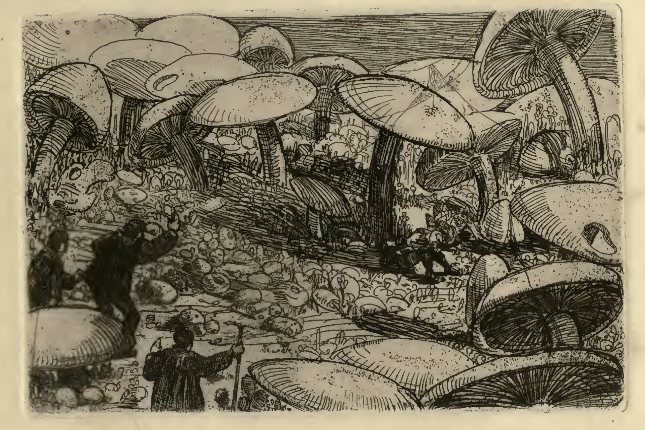
would never have saved the bather from the
malicious grasp of a giant water-bear. The beast had already
punctured the toe referred to, but was driven off before serious
damage was done. It had had time, however, to inject an
anæsthetic, as our comrade passed into a comatose state after
about one minute, and did not revive for over half an hour. ¶So
accustomed had we now become to our new surroundings that we
passed a few days not unpleasantly, drifting down the stream. The
vegetation, though luxuriant of its kind, grew much less dense,
and we came at length to more or less open country. There plant
life was represented by mushroom-like fungi arranged in clumps
over the plain. Our artist was in specially good spirits, and, on
our mooring alongside the bank, took the opportunity to scramble
on to the top of a clump of giant toadstools hard by, intending
to size up the sketching possibilities of the neighbourhood. A
sharp report shortly afterwards attracted our attention in time
to see him executing evolutions in mid-air about fifteen feet
above the summit of the toadstools and some thirty feet from the
ground. It happened that this particular toadstool was matured
and required to burst it only the slight irritation supplied by
our comrade in mounting. Fortunately the bed was soft to fall
back upon, else a serious accident must have resulted. Our
ingenious engineer was much struck with this demonstration, and
conducted a series of experiments among members of the genus
fungi represented in the neighbourhood. As a result he brought to
camp some time afterwards a huge flat specimen which, he averred,
would make a fine mattress. In kindness of heart the specimen was
given to his companion of the afternoon's adventure. Judging by
the remarks made by the recipient during his sleep, he must have
passed an unusually pleasant night. Indeed the mattress appeared
to be still exerting a magic influence close on to the breakfast
hour, when several attempts failed to rouse the slumberer. Then
up came the ingenious engineer, who, with a prick of an ice-axe
in the proper place, fired the mattress, and shot its burden from
the depths of sleep into broad daylight via the tent roof. ¶From
this point on the river water became increasingly more brackish,
so that we were much exercised in our minds regarding the future
source of our water-supply. After traversing several shallow
lakes, the matter became critical, and we decided to moor up to
the bank. The neighbouring country was almost desert compared
with the jungle left behind. The saline soil supported only
stunted vegetation, except for occasional clumps of mushroom-like
fungi standing on local elevations of the ground. We were some
distance from camp, making a reconnaissance, when a heavy
rain-storm commenced. Perfect shelter was obtained beneath the
umbrella of the fungi. As time went on, however, and the downpour
did not abate, we grew anxious for the safety of our
commissariat. Shortly afterwards we might have been seen marching
back to camp each sheltered under one of these novel umbrellas.
The adjacent country already showed signs of flooding. It was
therefore deemed best to pack our gear and remove it to one of
the elevations. The waters continued to rise even after the rain
ceased, so that our position was again threatened. We were now
thoroughly alarmed, and hastily transferred all our possessions
to a flotilla of queer crafts, consisting of fifteen large
mushroom-shaped fungi set in the floating position, and lashed
together with Alpine rope. Hardly had these preparations been
completed than the lapping waters swept us off in the strong
current. We were eventually carried into a great salt lake. ¶As
the only fresh water available for drinking purposes consisted of
that which chanced to have been caught in the bilges of our
crafts, great relief was felt when a steady wind set in, driving
us gently before it. Two days later we were fortunate enough to
reach the further shore, and, entering the débouchure of a large
stream, succeeded in travelling some distance up it with a still
favourable wind. Finally, on account of the opposing current, we
had to abandon the water and march on land. ¶One morning, just as
most of us were rising, a scampering noise was heard without,
accompanied by encouraging shouts of "Hi yah! hi yah! Stick it,
boy!" Presently one of our equestrians, who had risen early to
take his accustomed morning walk, came riding up, mounted on a
new species of a monstrous mite. He pulled rein with a "How's
this for a specimen, Mr. Biologist!" "Go to
———!" was the answer, which meant that the
scientist was not having any. This portion of our journey proved
very wearying, as our daily marches were extended as long as
possible. The direction in which we had been travelling, being
across the main topographic features of Bathybia, was calculated
to yield a maximum of information in a minimum of time. Time,
however, was now becoming a serious matter, though new
information never failed. Since leaving the great salt basin of
the central regions
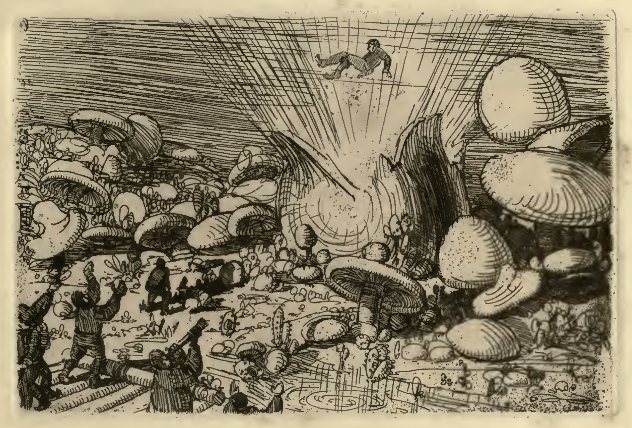
our track had consistently risen. The total
amount of this elevation now amounted to close on 6000 feet. The
Jungle was fast becoming too dense to penetrate. Therefore, as a
final coup before retracing our steps, we decided to ascend a
high volcanic cone lying close by our course. From its summit,
some 17,000 feet above, much information might be gained. A
summer snow-cap descended for about 4000 feet, whilst a perpetual
wreath of smoke curled towards the sky from the summit. It was
noon three days later that we made our camp just below the
snow-line. The afternoon was spent by most of us in a visit to
the summit. Hydrocarbons were escaping from fissures in the
ground near the summit, whilst continuous flames played about the
crater where the greater heat kept the escaping gases ignited.
The rocks were very basic and heavy. Metallic iron occurred in
many of the outcrops, and copper fibres were observed in not a
few. However interesting these observations were, they did not
prevent us drinking in the distant panorama. Far behind were the
great salt sea and saline borderlands. Ahead was a sea of jungle
spread over gradually rising plains. Beyond, where frigid
altitudes were reached, a great snowy plateau carried the picture
beyond the horizon. The whole party was overcome with the immense
wild grandeur of the scene, and when it was time for return we
retraced our steps down the snowy slopes in silence. From this
reverie we were suddenly awakened by a shout from the foremost,
who had come upon the body of a huge animal, about four feet in
length, partly buried in the ice. The biologist examined the
beast, and reported it to have affinities between the water-bears
and the mites, but distinct from anything so far noted in
Bathybia. We got to work with our ice-axes and soon had him out.
The body being more or less cylindrical, we found no trouble
rolling our prize to the camp near by. In the first instance our
intention for so doing was merely to astonish our comrades.
However, the biologist, seeing the specimen still intact, asked
that it might be spared till further investigated. It was the
peculiarity of our biologist to save his specimens for
examination during the early morning hours. ¶After supper, it
being the eve of our return journey, a general discussion
regarding the natural history and physical data so far
experienced in Bathybia was instituted. Summarising the various
points brought forward as bearing on a scientific elucidation of
the phenomena, the following are worthy of note. Bathybia was a
great depression some hundreds of miles across, bounded on the
east by a great fault face, but with more gently rising
boundaries in other directions. In fact it might be likened to a
portion, for example, of the basis of the Pacific Ocean from
which the water had been removed. It seemed to us almost certain
that the earth's folding and faulting, giving place to this
configuration, must have taken place at a period corresponding to
a maximum phase of a great ice age, when the Antarctic regions
supported an ice-cap of stupendous thickness. The ice must then
have played the role of rock when the great earth movement
referred to occurred. At a later date, as the ice age passed
away, ablation, removing the ice strata, exposed the deep basin
of Bathybia. The lower portions of this basin, situated below so
great a thickness of atmosphere, was blanketed from the great
cold of the upper regions. To this end, also, the humidity and
increased abundance of carbon dioxide in the atmosphere aided.
Although in succeeding times the highlands above were deeply
buried under snowfields, this deep plateau-locked basin could
keep its floor for the most part unencumbered with water. The
atmospheric circulation, being distinct from that of the outer
earth, presented special features. What was most to be remarked
with respect to the atmosphere was that it contained a minimum of
dust particles; so that, though the air was saturated with
moisture, condensation seldom took place, except along the
borderlands, where fogs were very prevalent. The great
rain-storm, producing the flood we had experienced, was probably
due to an unusual disturbance of an anti-cyclonic nature, whereby
dust-mote-loaded air of the anti-trade belt above had descended,
causing sudden condensation. The waters, continually draining
into a central basin and there evaporating, led to the production
of a residual salt sea. ¶A knowledge of the strata underlying the
basin would have been of the greatest value, but of course
exposures were not available. However, a great accumulation of
coal-producing matter was presented in the jungle zone. Extinct
volcanic activity had been noted along the fault scarp, and
specially interesting was the active volcano on which we now
stood. The great basicity of the lava, and the fact that it
contained metallic elements, and probably also exhalation of
hydrocarbons, showed it to be typical of the deeper earth crust.
The abundance of plant and animal life, and especially the
curious restrictions governing their range, seemed, at first
acquaintance, inexplicable. The biologist now drew attention to
the fact that all the species represented were but curiously
developed forms of types already known to the scientific world.
They had suffered but little variation, though many had increased
enormously in size. Furthermore, it was known that such species
could at one stage or another in their life-history be
transferred for great distances by wind agency. Also many, even
in adult state, after remaining frozen for long periods,
maintained the power of reanimation when thawed out. ¶In the
light of this information, it seemed most reasonable to suppose
that the invasion of plant and animal life had come from warmer
climes through the agency of the anti-trade winds. ¶It was just
about 2 a.m., when a select few were in the act of brewing their
tenth cup of tea since supper, that a movement in one of the
sleeping-bags attracted attention. An arm and then a head
appeared, followed quickly by the rest of the body. Silently the
figure slipped on his boots, and a moment later passed out of the
tent with the intention of inspecting his specimen. ¶Almost
immediately a wild commotion rent the air, and as we burst from
the tent a terrifying spectacle met our gaze. The beast we had
left frozen a few hours ago had thawed out and come to life, as
is the wont of the water-bears when subjected once again to
congenial conditions. In this case, however, the term of
hibernation had been extended to centuries, so that no doubt in
the interval this savage species had become practically extinct.
Our comrade was frantically struggling with his specimen, and
into the mêlée we threw ourselves. The din grew louder, and
slowly but surely out of the confusion rose a voice, which smote
clearer upon me: "Rise and shine, you sleepers—8.45, and
time for tables down!" ¶There in the passage was the horrid
figure of the night-watchman replacing our washing-up bowl, which
had just served him as a breakfast-gong. As I sleepily drew on my
clothes, regretful at sacrificing Bathybia for Cape Royds, I
meditated how much can happen in Dreamland during a short
quarter-hour.
PRINTED BY BALLANTYNE AND
COMPANY
LIMITED. AT THE BALLANTYNE
PRESS, TAVISTOCK STREET
COVENT GARDEN
LONDON
[END]

This site is full of FREE ebooks - Project Gutenberg Australia



